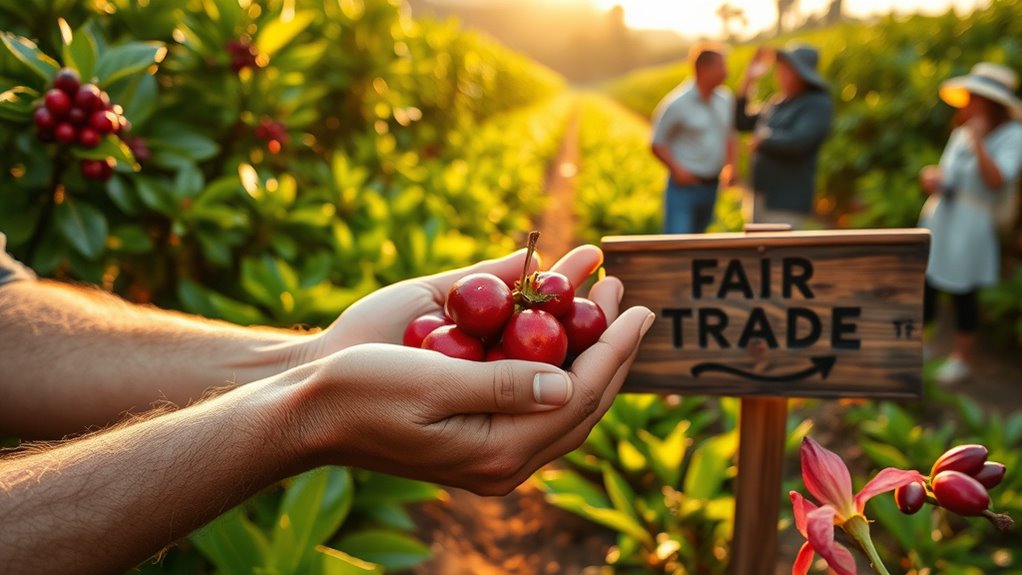To support ethical coffee practices, start by choosing brands with Fair Trade, Rainforest Alliance, or USDA Organic certifications. Look for transparency on sourcing methods and consider supporting local roasters who prioritize direct trade relationships with farmers. Your purchase can empower communities and promote sustainable practices. Engage in discussions about coffee ethics within your community to raise awareness. If you want to uncover more ways to make a difference, keep exploring the options available.
Key Takeaways
- Choose coffee brands with certifications like Fair Trade, Rainforest Alliance, and USDA Organic to ensure ethical sourcing practices.
- Research brands’ sourcing practices on their websites for transparency about their relationships with farmers.
- Support companies that prioritize sustainable methods and eco-friendly packaging to reduce environmental impact.
- Engage in community discussions and forums to share and receive recommendations on ethical coffee brands.
- Advocate for transparency and accountability by encouraging brands to disclose their supply chain practices.
Understanding Ethical Coffee
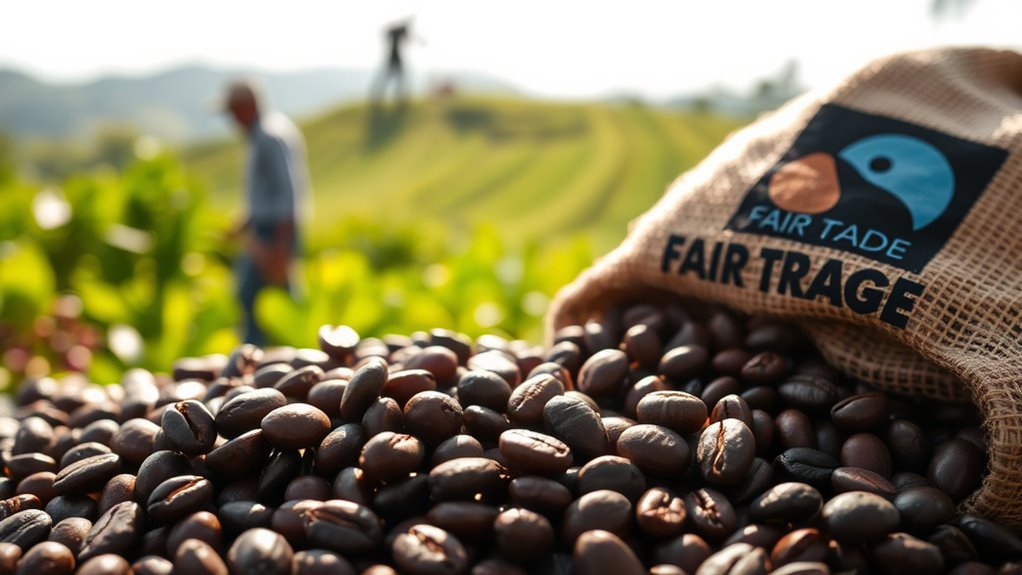
When you think about coffee, it’s important to contemplate the ethical implications behind your cup. Ethical coffee encompasses the entire coffee supply chain, guaranteeing fair treatment of farmers while promoting sustainable practices.
By supporting brands that foster direct relationships with coffee farmers, you contribute to fair wages and community empowerment. Certifications like Fair Trade and Rainforest Alliance guarantee that your choices lead to social justice, better working conditions, and environmental sustainability.
Additionally, sustainable methods, such as shade-grown coffee, protect biodiversity and conserve resources. Your consumer choices can drive positive change in the industry, encouraging more brands to adopt ethical practices.
The Importance of Sustainable Sourcing
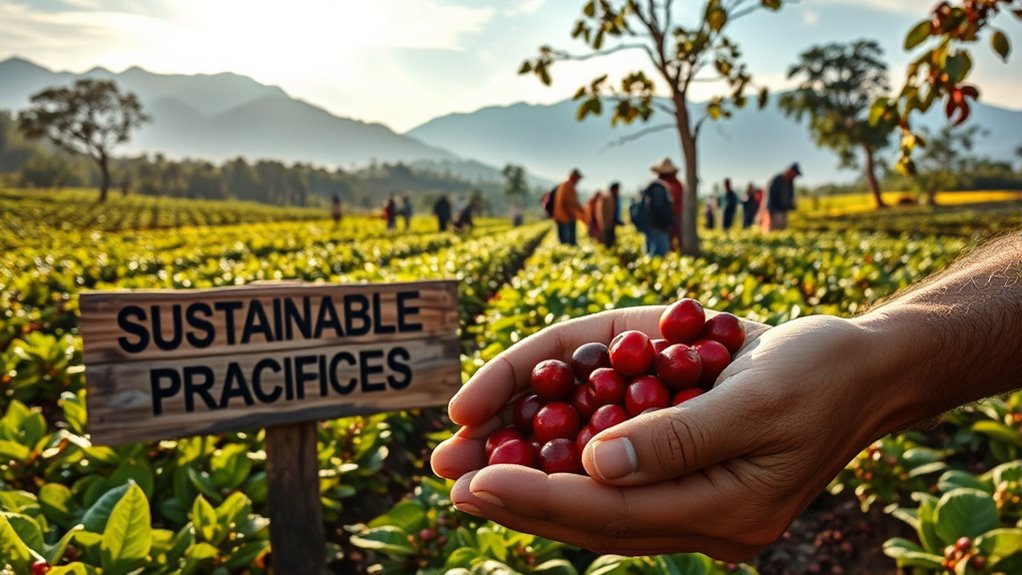
Sustainable sourcing is essential for ensuring that your coffee consumption has a positive impact on the environment and the lives of farmers. By making mindful choices, you support ethical practices that promote fair wages and safe working conditions. Certification programs guarantee transparency in the supply chain, protecting farmers and enhancing quality coffee. Many sustainable brands prioritize eco-friendly packaging to further reduce their environmental impact.
| Benefits of Sustainable Sourcing | Impact on Farmers |
|---|---|
| Environmental impact reduction | Fair wages |
| Biodiversity protection | Improved livelihoods |
| Quality coffee enhancement | Community support |
When you choose sustainably sourced coffee, you drive positive change in the industry. Your consumer choices can lead to environmental stewardship, supporting not just the planet, but also the farmers who work tirelessly to bring you that perfect cup.
Identifying Ethical Coffee Brands

Finding ethical coffee brands can be a straightforward process if you know what to look for. Here are some key points to help you identify ethical options:
- Look for certifications like Fair Trade, Rainforest Alliance, and USDA Organic that guarantee fair treatment of farmers and sustainable farming practices.
- Research sourcing practices on the brand’s website; ethical brands often share details about their relationships with farmers and their transparency.
- Be cautious of claims; brands without certifications may lack genuine ethical verification.
- Engage with community forums and social media groups to read reviews and share recommendations on brands committed to farmer welfare and ethical coffee.
Making informed choices can greatly impact the coffee industry and support sustainable practices.
Supporting Fair Trade and Direct Trade

Supporting fair trade and direct trade practices can greatly enhance the impact of your coffee purchases. By choosing fair trade coffee, you’re ensuring farmers receive fair prices, which empowers their communities and promotes sustainable livelihoods.
Direct trade takes this a step further by fostering relationships between roasters and farmers, leading to higher prices and better support for eco-friendly farming methods. Your coffee choices can contribute to community development projects funded by the Fair Trade Premium, improving education and healthcare.
Both fair trade and direct trade prioritize environmental sustainability, requiring farmers to adopt practices that protect resources and biodiversity.
Plus, direct trade offers transparency in the supply chain, letting you trace your coffee back to its source and understand its impact.
Engaging in Community Discussions

Engaging in community discussions about ethical coffee practices can considerably enhance awareness of your coffee choices’ impact on farmers and the environment.
Engaging in community discussions about ethical coffee practices raises awareness of the impact our choices have on farmers and the environment.
By participating in these conversations, you’re not just learning; you’re also helping others understand the significance of sustainable sourcing.
Here are some ways to get involved:
- Host local coffee tastings featuring ethically sourced brands to share their stories.
- Share educational resources like articles and documentaries on challenges faced by farmers.
- Organize workshops on certifications such as Fair Trade and Organic.
- Encourage local coffee shops to discuss their sourcing practices for greater transparency.
Advocating for Transparency and Accountability
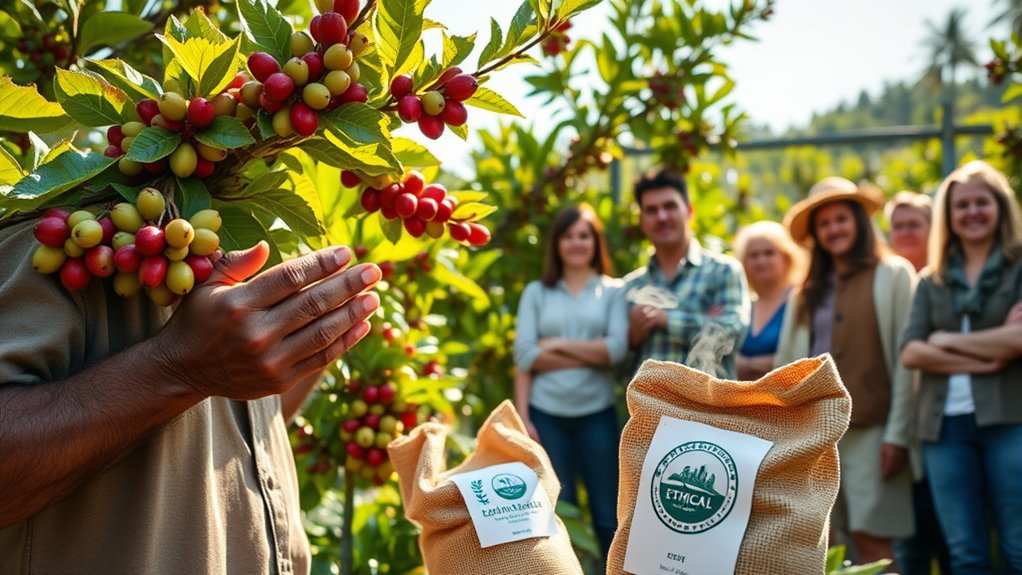
When you advocate for transparency and accountability in the coffee industry, you help affirm that your coffee choices reflect ethical practices.
By demanding transparency in the coffee supply chain, you ascertain that your coffee is ethically sourced and that farmers receive fair compensation.
Support brands that prioritize accountability and share detailed reports on their sourcing practices and environmental impact.
Certifications like Fair Trade and Rainforest Alliance highlight brands committed to sustainable practices and ethical sourcing.
Your consumer pressure can encourage more brands to disclose their supply chain practices, fostering a culture of responsibility.
Engaging in discussions about ethical brands not only raises awareness but also promotes accountability across the industry, making a significant difference for farmers and the environment.
Supporting Local Roasters and Farmers
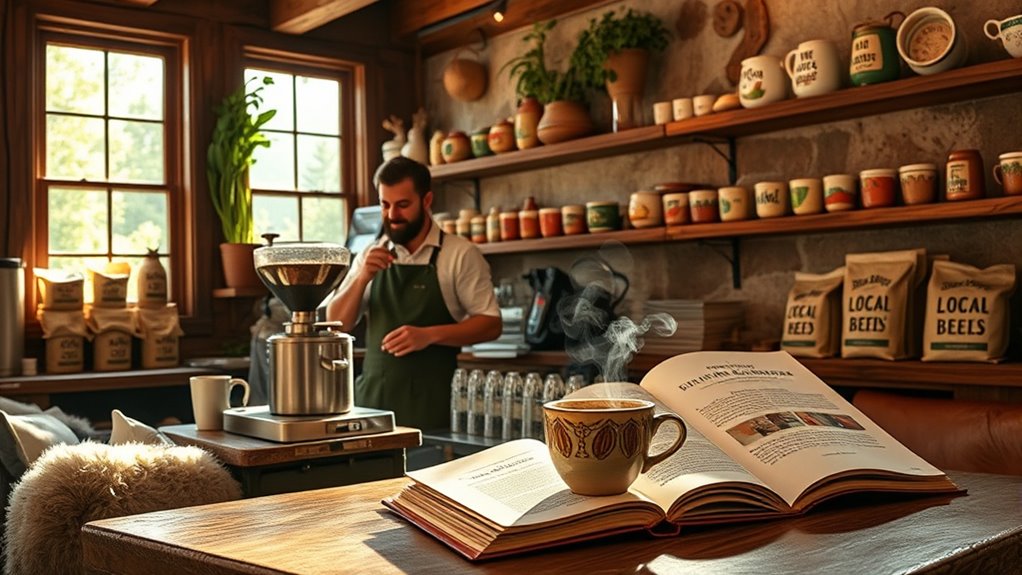
By choosing to buy from local roasters, you not only enjoy unique and diverse coffee flavors but also help foster meaningful relationships between consumers and farmers. Supporting these businesses promotes ethical sourcing and sustainable practices that benefit everyone involved.
Choosing local roasters enriches your coffee experience while building strong connections between consumers and farmers.
Here’s how you can make a difference:
- Direct Trade: Local roasters often connect personally with farmers, ensuring fair wages and supporting their economic stability.
- Transparency: You’ll know exactly where your coffee comes from and how it’s produced, enhancing your connection to the farmers.
- Specialty Coffee: Experience flavors that truly reflect the unique cultures of coffee-growing regions.
- Community Impact: Your purchases stimulate local economies, creating jobs and reinvesting in your community.
Together, we can champion ethical coffee practices!
Frequently Asked Questions
How Can Coffee Be Ethically Sourced?
You can ethically source coffee by choosing brands that prioritize Fair Trade certification, ensuring farmers earn fair wages and work in safe conditions.
Look for companies with direct trade relationships, which often provide better prices for farmers.
Seek out certifications like Rainforest Alliance or USDA Organic for environmentally sustainable practices.
Finally, support brands that emphasize transparency, allowing you to trace your coffee’s journey from farm to cup and verify ethical sourcing.
How Can a Coffee Shop Be Ethical?
Running an ethical coffee shop isn’t just good for business; it’s a warm embrace for the community.
You can source your beans from certified suppliers who prioritize fairness and safety for farmers. Building direct relationships with growers allows you to support their livelihoods while offering quality.
Don’t forget to adopt eco-friendly practices and educate your customers about your choices. By doing this, you’ll create a ripple effect of positive change in the coffee world.
What Are the Ethical Issues With Coffee?
When you think about the ethical issues with coffee, consider the low wages farmers earn, which keeps them in poverty.
You might also notice child labor and unsafe working conditions, often due to lax regulations.
Additionally, harmful pesticides pose health risks, while deforestation for plantations threatens biodiversity.
Finally, coffee’s significant carbon footprint contributes to climate change, making it essential to address these concerns for a more sustainable future in coffee production.
Does Starbucks Provide Ethical Practices?
Yes, Starbucks does provide ethical practices.
They implement the C.A.F.E. Practices framework, ensuring that their coffee sourcing meets strict standards for transparency and social responsibility.
You’ll find that Starbucks invests greatly in supporting coffee farmers through loans and technical assistance.
This commitment not only helps farmers thrive but also fosters a connection between you and the communities behind your coffee.
Conclusion
By choosing ethical coffee, you’re not just brewing a cup; you’re planting seeds for a better tomorrow. Imagine each sip as a drop of rain nourishing a thriving garden, where farmers flourish and communities grow stronger. With over 125 million people relying on coffee for their livelihoods, your choices matter. So next time you enjoy your morning brew, remember—you’re part of a larger story that fosters sustainability and fairness. Let’s cultivate a world where everyone benefits.
